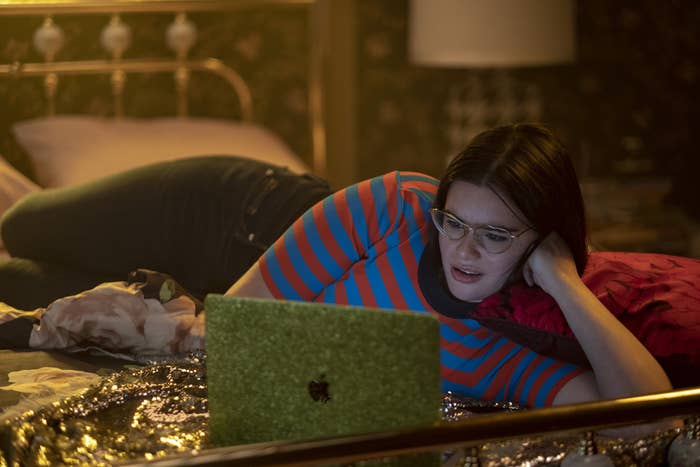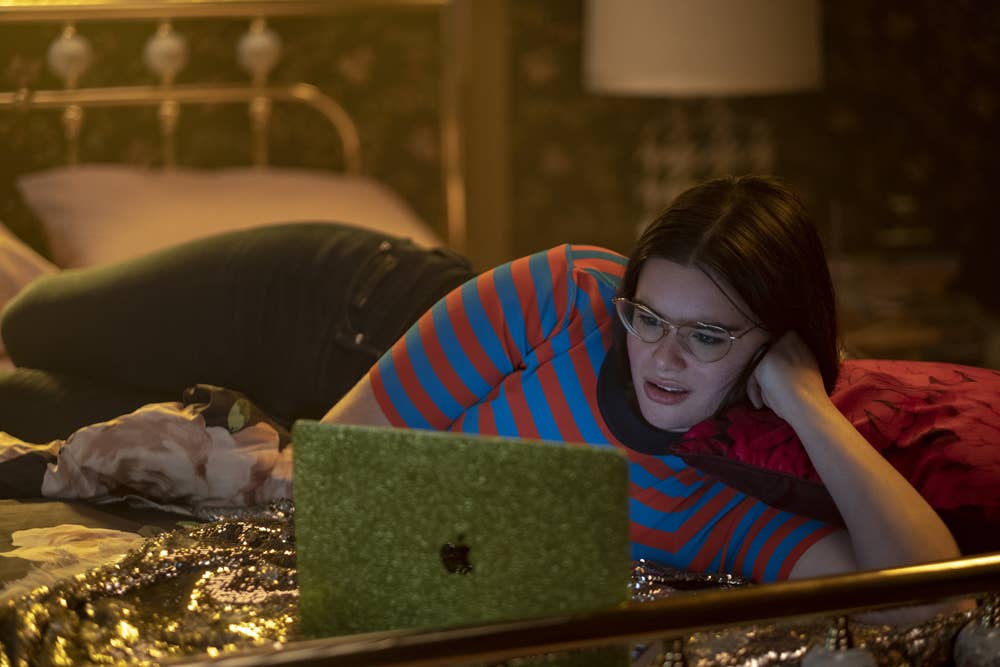
Reports that Netflix would be adopting Dennis the Beeper King’s aphorism—“technology is cyclical”—have been greatly exaggerated. Netflix, the standard bearer in innovating and upending TV (and movies) as we know it, is *not* regressing to weekly installments, a format they all but made fun of when they entered the original programming arena. This is a rollout method they’re employing for their new competition show Rhythm & Flow, one they’ve already applied to the Great British Baking Show, so as to keep up some measure of suspense. Our (and many other sites’) article explains as much, but that hasn’t stopped our Twitter mentions from melting down over the misconception that this practice would be wide-ranging (because no one reads the article, just the headline sigh.) So relax: Netflix seasons for their original dramas will not be parceled out weekly, much like—cue the internet’s collective shudder—cable. But guess what? They should be.
My stance on this is quite simple: Binging is bad. It is the pros and cons of instant gratification writ large, gluttonous consummation that ends as all gorges do: satisfying in the moment, with a stomach ache not far behind. To be clear, binging has been around since the days of the DVD box set, when viewers opted to wait for a season of say, 24, to hit home video so they could enjoy the propulsive narrative free of momentum-killing commercials, repeats and the months-long stretches between episodes in order to pad broadcast’s September—May calendar. A time when spoilers and plot points were more easily avoidable than muting every imaginable correlating keyword on Twitter until you had time to watch.
It made sense why Netflix would go with this model once they started producing their own content, and even moreso why consumers would embrace and be excited by it. Remember, the service really popped when people used the mail-delivery disc method and later streaming to catch up on old seasons of shows like Breaking Bad and Mad Men as their popularity crested, with hundreds or thousands of people racing through episodes so they could experience the respective final seasons live. So if you already associate Netflix with racing through prestige television, of course that’s how you’d expect to receive it when they start producing their own.
The problem is, those instant, auteurist classics Mad Men and Breaking Bad weren’t released all at once, nor were they made to be. Neither was Game of Thrones, the series finale of which, as nearly every publication cried wolf in the lead-up to its airdate, foretold the end of TV monoculture as we know it. Sure, there were plenty of people who tore through 67 episodes of Thrones ahead of Season 8 just so they could squeeze onto the last free spaces on the bandwagon. To each their own. But (one of) the pleasure(s) of watching Thrones, Mad Men, Breaking Bad, and all of cable’s other classics in real-time lay in experiencing each season week-to-week, with Sunday-night Twitter and Monday-morning watercoolers stoking the hype flames between installments. Would The Red Wedding or “Ozymandias” have had the cultural, timeline-stopping effect they did if they were released all together with the rest of their respective season, at 3AM/12AM EST/PST, which we all progressed through at our own speeds? Arguably not, my brothers and sisters. These were episodes that helped their series become capital-e Event Television—you had to be there, and if you weren’t, you’d make damn sure you were there for the next.
Binging is like chugging wine
But even that wouldn’t be such a big deal(breaker) if it didn’t seem as if binging was slowly diluting, and potentially eradicating episodic flourishes with each passing year. The more series that are produced with the foreknowledge that they will be available all at once, the more the borders between episodes are beginning to melt away as creators explaining that their series is “more like a 10 hour movie” becomes more and more popular. That’s dangerous, and also douchey thinking; television and film are separate mediums for a reason, the fundamentals of narrative and storytelling work differently. Implying that they’re interchangeable belies a deep misunderstanding of both. As such, plenty of Netflix Originals feature seasons with episodes that have no technological or narrative distinction, merely hours of plot that bleed into each other, notable only for certain twists or plot development. The end result, whether the season is eight episodes or 13, is an arc that inevitably sags in the middle, usually to the detriment of emotional investment in its finale, with no stylistic or technical flair to carry a thin story. (The TV critic Mo Ryan came to call this trend "Streaming Drift," which the critc Emily VanDerWerff then wrote about here.)
To put it another way, in a binge-first world, I don’t think you get runs like, say, the first half of Mad Men Season 5, which featured a horror-tinged installment inspired by the ‘60s Speck murders to explore Don Draper’s anxieties over monogamy (“Mystery Date”), next to Pete Campbell’s losing battle with suburban ennui and impotence (“Signal 30") next to “Far Away Places,” an episode that splits the ensemble off into solo adventures, with murky Pulp Fiction-style chronology that makes each story land with greater emphasis once the pieces come together. All instant series classics, all vastly different forms of storyelling in service to the greater unified themes.

If these were just nostalgic ramblings from someone who preferred The Way Things Were, this take would be a non-starter. But this summer alone we’ve seen Succession and Euphoria, nascent series benefiting from the thrills of watching one hour a week together, with more joining in as word of mouth spreads in the days in-between. Both are on HBO, one of the last networks holding to the old ways that still regularly produces series that make noise. Both have episodes packed with narrative and aesthetic flourishes rich enough to keep audiences fed for six days but also ravenous for more. Both have increasingly rabid fanbases that have fun identifying and dissecting story kernels in the interim between episodes while collectively musing about where the narrative might go and praising the performances. Watching a show like Euphoria debut with full command of its tone and vision and get more assured in each passing week was a thrill; watching Succession make its case as the best show on TV one hour at a time has been even more exciting. The same creative team behind Riverdale also produces Netflix’s Chilling Adventures of Sabrina. The former may have gone off the rails now but it was arresting on arrival; the latter, with no network-television confines to work within and keep it in check, is bloated, dull, and after just five episodes inspired me to give up and just rewatch Buffy. Meanwhile, Netflix competitor Hulu has figured out an intriguing compromise: releasing the initial two or three episodes of a new season first to hook the instant gratification crowd in, then relegating to weekly installments for the remainder. Disney+, the coming service that looks to be Netflix's biggest threat, is going full one-per-week like it's 2003, bless their hearts. (No word yet on what Apple is doing besides canceling shows already and out-spending Game of Thrones; they'll likely make their strategy clearer during Tuesday's keynote.)
Several replies to the Netflix news when the misconception ran rampant was that their original series aren’t compelling enough to warrant week-to-week patience, which is troubling in its complacency considering people pay for this service. Netflix is seemingly content with serving a lot of mid, while some of its better shows, as a result of binging, come and go. Is anyone still talking about Stranger Things 3, even though its finale was one of the finest episodes of the series?
I’ve binged. I ran through the new season of Mindhunter on a Sunday because I was hungover and the story was heating up (and its episodes are formless to begin with but that’s for a different take). As someone who frequently reviews TV, the screener system requires me to binge as well. But, left to my own devices, like when I caught up with Mad Men Seasons 1 and 2 ahead of 3, or on the rare series I’m left to indulge on my own without worries of covering, I like to limit myself to no more than two episodes at a time. Binging is like chugging wine—a rush to the desired effect with no focus on savoring. And it’s slowly draining TV, both in its creation and consumption, of its flavor. Netflix would do well to reconsider, as its competitors begin to form different strategies. If they don't start putting quality over quantity, streaming's biggest pioneer may end up as the coming Streaming Wars' biggest casualty.

